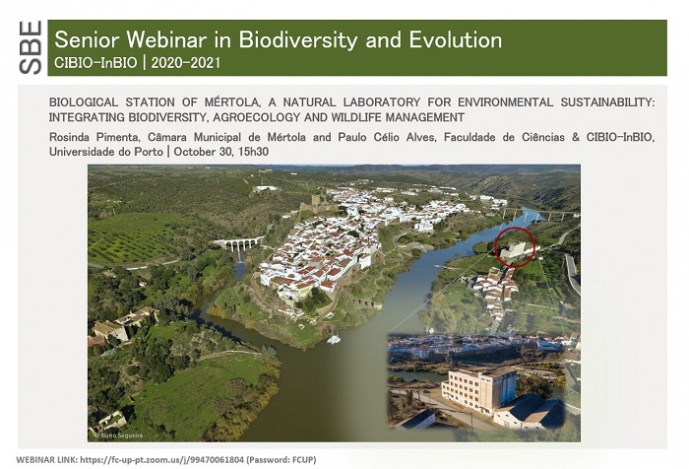Biological Station of Mértola, a natural laboratory for environmental sustainability: integrating biodiversity, agroecology and wildlife management

SENIOR WEBINAR IN BIODIVERSITY AND EVOLUTION
Guadiana valley is an interesting region where culture and nature heritage have merged during centuries. The admixture of different cultures over thousands of years, promoted by the navigation through the River Guadiana until Mértola, made this village an important commercial center, where Islamic and Roman societies have shaped the landscape. On the other hand, the steep topography, high aridity, and poor soil quality never allowed intensive human occupation and agriculture, allowing the occurrence of pristine Mediterranean shrubland areas in the region, and harbouring one of the highest biodiversity levels in southwestern Europe. The Natural Park of Guadiana Valley has been promoting the integration of biodiversity conservation, and sustainable agriculture. The success of the reintroduction of the Iberian lynx in this region, where there is the highest hunting pressure in Portugal, is a good example of synergies between conservation and land use. Other projects as the creation of regenerative pastures, syntropic framing are also being developed in the area. The cooperation between Mértola Municipality and CIBIO-InBIO led to the successful approval of two emblematic projects for this region: the establishment of a Biological Station and a Biodiversity Museum in Mértola. In this seminar, we will give the recent insights on these two projects.
Rosinda Pimenta, Councilor of the Municipality of Mértola with responsibility for Culture, Heritage, Sports, Youth, Human Resources, Tourism and Sustainable Development. Coordinator of Mértola's candidacy for UNESCO World Heritage. Representative of the Municipality of Mértola in the Installation Committee of the Biological Station of Mértola.
Paulo C Alves, Associate Professor at University of Porto, Affiliate Professor at University of Montana, Affiliate Curator at the Cornell Museum of Vertebrate/University of Cornell, and vice-scientific coordinator of CIBIO-InBIO Associate Lab, University of Porto. Heads the Conservation Genetics and Wildlife Management research group. His main research field is conservation genetics, ecology and wildlife management, in particular lagomorphs (rabbits and hares), small mammals and carnivores. Representative of CIBIO-InBIO in the Installation Committee of the Biological Station of Mértola.
[Host: Paulo C. Alves, CONGEN]